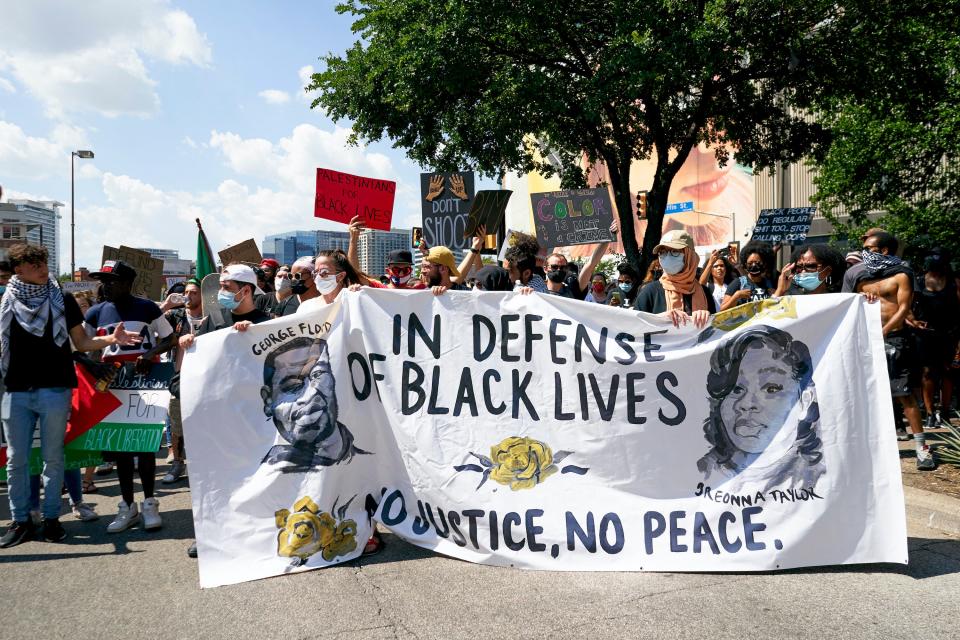Scientists say they've pinpointed the reasons why people protest. They're all visible in Black Lives Matter demonstrations.

Researchers from the Netherlands looked at the scientific literature covering why people protest.
From the existing published papers, the authors came up with five overarching theories: grievances, efficacy, emotions, identity, and social embeddedness.
Though the study was published in 2013, protesters participating in the Black Lives Matter movement today show similar reasons for making their voices heard in the streets.
There are many reasons why people protest, but researchers in the Netherlands say they've teased out the motivations fueling the desire to join public demonstrations like the Black Lives Matter rallies happening across the country in the wake of George Floyd's killing.
Psychologist Bert Klandermans and sociologist Jacquelien van Stekelenburg, both of VU Amsterdam, looked at the social psychology literature on protests since the 1950s. They mainly looked at books and articles about protest analysis with a social psychological approach, and focused on Western democratic countries, van Stekelenburg told Insider.
The authors say you can think of protest as a type of market metaphor — the type seen in an economics class. In economics, consumers demand a product and suppliers give it to them. Enough aggrieved citizens will demand protests, and then organizations will need to help supply them by coordinating when and where a protest happens.
Van Stekelenburg equates the role of marketing in economics to mobilization, or getting people from their homes and into the streets, for protests. Marketers identify demands and help lead consumers to the best product for that demand. Protest mobilizers see that people are angry and help guide protesters to the street at a certain date and time. While it may sound crass, you can think of why people protest as why they would buy a product.
The reasons why protests occur are unique, and the paper focused on social psychology and not behavioral economics. The study, published in Current Sociology Review in 2013, found five main factors behind why people protest — and they mirror what we see in Black Lives Matter demonstrations today.

Bastiaan Slabbers/Reuters
Grievances
Citizens must be angry about something, which creates a demand for change.
"Most of the time, nothing happens," Klandermans said. "They're angry, they're angry, and they are angry, and then nothing happens."
But Klandermans explained that when a grassroots organization or a political leader comes along, they can help mobilize these angry citizens into action.
Efficacy
Efficacy is an individual's belief that they can change their conditions or policies through protest, the researchers wrote.
They base this statement on 2008 research finding that those who feel high efficacy are also more likely to participate in a protest. The authors also used older research from 1999 suggesting that group rather than personal efficacy prompted people to protest.
Mariah Parker has been the Athens-Clarke county commissioner for Athens, Georgia, since 2018. Parker helped organize protests for a variety of issues and has recently participated in some of the past 10 Black Lives Matter demonstrations in the college town.
"We have all the energy as young folks," Parker told Insider. "When we gather collectively and have a show of strength in terms of sheer numbers, I think that can be pretty powerful."

Mario Tama/Mario Tama/Getty Images
Identity
The more you identify with a group, the more likely you are to participate in protests benefiting that identity, van Stekelenburg said. Even if you're not a part of that group, identifying with others creates an awareness of your shared fate in your political system, which can spur you into action.
"I, as a Latina identifying woman, grew up in the melting pot bubble that is South Florida," Dayami Gomez, an NYC Buddy System Coordinator for Brooklyn, told Insider. "It wasn't until I moved to New York City last year that I became surrounded by [racism and police brutality]."
Gomez described watching and intervening when racism affected her Black and brown peers. The deaths of George Floyd and Breonna Taylor broke their hearts and hers.
"I became restless," Gomez said. "I didn't know how or what I was going to do, so I just got up, got dressed, and went outside to join my community."
Emotions
"Anger is seen as the prototypical protest emotion," Klandermans and van Stekelenburg wrote in their study, which posited protests as group-based anger transformed into action.
Anger, rather than other emotions like shame, despair, or fear, also gives people a more adversarial relationship with authorities, the authors wrote.

Cooper Neill / Stringer / Getty Images
Social Embeddedness
People came together to make protests occur. Talking to others about what's wrong in your society creates shared grievances and emotions instead of personal ones, van Stekelenburg said.
These networks also help identify "what's making us mad, who's to be blamed, and what can we do about it," she said.
And when other social networks or political leaders create the means to mobilize, it's these social networks that keep people accountable. Social networks are of the "utmost importance" for protests to occur, van Stekelenburg said.
The NYC Buddy System helps people find others to attend BLM protests with. It also gives information on where and when protests will happen.
"The reason I first got involved was because I supported the BLM movement but felt that reposting and donating didn't seem like enough," Emely Jude, an NYC Buddy System Coordinator for Queens, told Insider.
Jude couldn't physically protest due to family members at high-risk for COVID-19, but she saw the NYC Buddy System as one way to participate in the social movement.
"This was all started to help those who were going to protests, rallies, chalk-writings, etc, to be able to have a group or someone to go with if they were planning on going alone," Jude said. "It has been a unifying feeling getting to see how willing people are to help one another, even if it's to simply answer a question."
Read the original article on Insider

